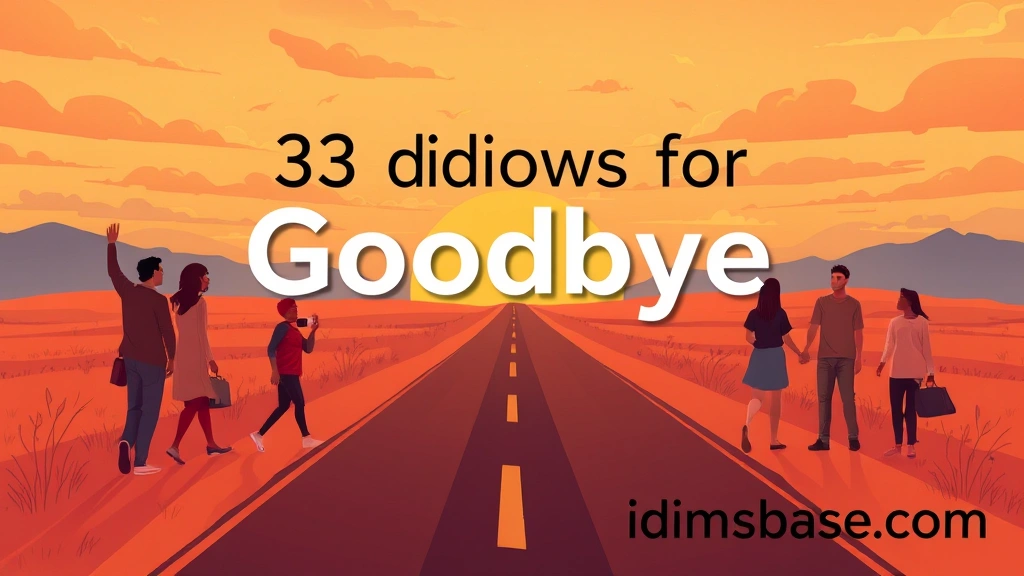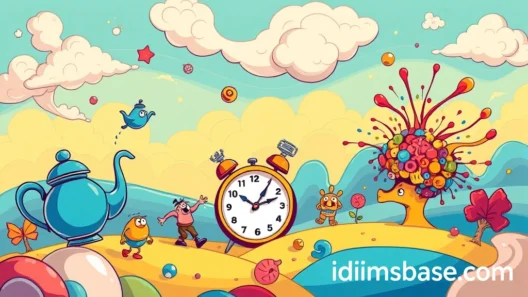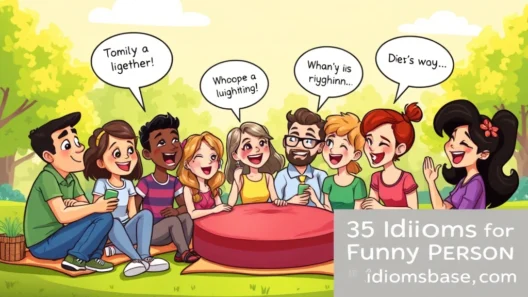You know that feeling when you've just had the most amazing time with friends, but it's time to part ways? Or maybe you're wrapping up a successful business meeting, and you want to leave a lasting impression? Saying goodbye is an everyday occurrence, but sometimes "goodbye" just doesn't cut it. It can feel a bit… flat, right?
That's where idioms come in! English is bursting with colorful, expressive phrases that can transform a simple farewell into something memorable, witty, or even profound. These aren't just fancy words; they're snippets of culture, history, and a whole lot of personality.
Whether you're looking to add a touch of flair to your everyday conversations, impress your English-speaking colleagues, or simply expand your linguistic horizons, you've come to the right place. We're about to dive into a treasure trove of 35 fantastic idioms for saying goodbye. Get ready to sprinkle some linguistic magic into your farewells!
Why Use Idioms for Goodbye?
Before we jump into our amazing list, let's chat for a moment about why these idioms are so useful.
- Expressiveness: They convey nuances that a simple "goodbye" can't.
- Memorability: People are more likely to remember someone who says something unique.
- Cultural Connection: Using idioms shows you're familiar with the intricacies of the English language and its culture.
- Fun! Let's be honest, they're just plain fun to use!
Ready to become a master of the farewell? Let's go!
35 Brilliant Idioms for Saying Goodbye
Here's your ultimate guide to making every departure a memorable one.
Casual & Friendly Farewells
These are perfect for friends, family, and informal situations.
- Catch you later!
- Meaning: See you later, implying a future meeting. It's super casual!
- Example: "Alright everyone, I'm heading out. Catch you later!"
- See ya!
- Meaning: A very informal and quick way to say "see you."
- Example: "Gotta run, see ya!"
- Later, gator!
- Meaning: A playful, rhyming way to say "later." Perfect for a lighthearted exit.
- Example: "Time for me to hit the road. Later, gator!" (Often followed by "In a while, crocodile!" as a response.)
- Take care!
- Meaning: Wishing someone well. It shows genuine concern.
- Example: "It was great seeing you, take care!"
- Have a good one!
- Meaning: Wishing someone a good day, night, or whatever event is next for them. Very versatile.
- Example: "Thanks for coming over, have a good one!"
- I'm out!
- Meaning: A very casual and direct way to say you're leaving.
- Example: "Okay, I've got to go. I'm out!"
- Peace out!
- Meaning: A trendy, casual way to say goodbye, often accompanied by a peace sign.
- Example: "Alright, gotta bounce. Peace out!"
- So long!
- Meaning: An older, but still charming, way to say goodbye. It has a slightly nostalgic feel.
- Example: "Well, so long, it's been a pleasure!"
- Cheerio!
- Meaning: A very British and cheerful way to say goodbye.
- Example: "Right then, I'm off to the shops. Cheerio!"
- Toodle-oo!
- Meaning: Another somewhat old-fashioned, but very cute and informal British farewell.
- Example: "See you next week, toodle-oo!"
- Gotta bounce/jet/skedaddle/run!
- Meaning: All these phrases mean you have to leave quickly. They convey a sense of urgency.
- Example: "Sorry, gotta jet, my train leaves in 10 minutes!"
Formal & Professional Farewells
These are ideal for business settings, formal events, or when you want to be polite and respectful.

- It was a pleasure meeting/seeing you.
- Meaning: A polite and professional way to express enjoyment of the encounter.
- Example: "Thank you for your time, Mr. Smith. It was a pleasure meeting you."
- I look forward to our next meeting/seeing you again.
- Meaning: Expresses anticipation for a future encounter, often used in business.
- Example: "This was a productive discussion. I look forward to our next meeting."
- Until next time.
- Meaning: A polite and open-ended farewell, suggesting future interactions.
- Example: "Thank you for your presentation. Until next time."
- Farewell.
- Meaning: A more formal and sometimes dramatic way to say goodbye, often used for longer separations.
- Example: "After 20 years, we bid a fond farewell to our esteemed colleague."
- All the best.
- Meaning: Wishing someone well in a general, polite sense.
- Example: "It was great working with you on this project. All the best!"
- Keep in touch.
- Meaning: Encouraging continued communication.
- Example: "We've had some great conversations. Please keep in touch!"
- Have a safe journey.
- Meaning: Used when someone is about to travel.
- Example: "It was wonderful having you. Have a safe journey home."
- I'll be in touch.
- Meaning: Indicating that you will contact them soon.
- Example: "I'll review the proposal and I'll be in touch by end of day."
Witty & Humorous Farewells
Want to leave 'em laughing? These idioms add a touch of humor to your departure.
- Don't be a stranger!
- Meaning: An invitation for someone to visit or contact you again soon. It's warm and friendly.
- Example: "It was great catching up. Don't be a stranger!"
- Adios!
- Meaning: Spanish for "goodbye," often used playfully in English.
- Example: "My taxi's here. Adios, amigos!"
- Hasta la vista, baby!
- Meaning: Famous line from "Terminator 2." Very dramatic and humorous.
- Example: "I'll be back… but for now, hasta la vista, baby!"
- See you around like a donut!
- Meaning: A silly, rhyming way to say "see you around." It's quite quirky!
- Example: "Well, off I go! See you around like a donut!"
- Smell ya later!
- Meaning: A very informal and slightly cheeky way to say goodbye. Best for close friends.
- Example: "Bye, guys! Smell ya later!"
- Hit the road, Jack!
- Meaning: From a famous song, used humorously to say it's time to leave.
- Example: "My ride's here, so I guess it's time to hit the road, Jack!"
Long-Term & Permanent Farewells
These are for situations where you might not see the person for a long time, or ever again. They carry more weight.
- Parting is such sweet sorrow.
- Meaning: From Shakespeare's Romeo and Juliet. It means saying goodbye is sad, but the anticipation of meeting again brings a sweet feeling.
- Example: "As we say goodbye to our graduating class, parting is such sweet sorrow."
- Go with God.
- Meaning: A deeply religious and heartfelt farewell, wishing divine protection.
- Example: "You're embarking on a dangerous journey. Go with God."
- Godspeed.
- Meaning: Wishing someone success and good fortune, especially on a long or important journey.
- Example: "As you set sail for new horizons, we wish you Godspeed."
- May the force be with you.
- Meaning: From Star Wars, a popular way to wish someone good luck and success.
- Example: "You've got a big presentation tomorrow. May the force be with you!"
- Happy trails!
- Meaning: Wishing someone a good journey or future, often with a slightly old-fashioned, cowboy feel.
- Example: "After years of service, we wish you happy trails in your retirement."
- Bon voyage!
- Meaning: French for "good journey," used when someone is about to travel, especially by sea.
- Example: "They're off on their round-the-world trip! Bon voyage!"
- Adieu.
- Meaning: French for "to God," implying a permanent or very long-term farewell. It's quite formal and dramatic.
- Example: "He bid adieu to his homeland, knowing he might never return."
- See you on the flip side!
- Meaning: A casual way to say "see you later," implying a new phase or future event.
- Example: "This project is done! See you on the flip side for the next one!"
- Catch you on the rebound!
- Meaning: A playful and slightly cheeky way to say "see you later," implying you'll meet again, perhaps unexpectedly.
- Example: "I'm off to grab some lunch. Catch you on the rebound!"
- Keep your chin up!
- Meaning: An encouraging farewell, especially if someone is going through a tough time. It means "stay positive."
- Example: "I know things are hard right now, but keep your chin up! We'll see you soon."

Choosing the Right Idiom
With so many fantastic options, how do you pick the perfect one? It's all about context!
| Factor | Considerations |
|---|---|
| Relationship | Are you talking to a close friend, a family member, a colleague, or a stranger? (e.g., "Peace out!" for friends, "It was a pleasure" for colleagues). |
| Formality | Is the situation casual, professional, or formal? (e.g., "See ya!" for casual, "Farewell" for formal). |
| Emotion | Do you want to convey warmth, humor, respect, or sadness? (e.g., "Take care" for warmth, "Hasta la vista!" for humor, "Godspeed" for deep respect). |
| Future Contact | Do you expect to see them again soon, or is this a long-term/permanent goodbye? (e.g., "Catch you later" for soon, "Adieu" for long-term). |
| Your Personality | Which idiom feels most natural and authentic to you? Don't force it! |
Experiment with a few that resonate with you, and you'll quickly find your favorites!
Frequently Asked Questions (FAQs)
Q1: What is an idiom, and why are they important for goodbyes?
An idiom is a phrase or expression whose meaning cannot be understood from the ordinary meaning of its words. For example, "kick the bucket" doesn't literally mean to kick a bucket; it means to die. For goodbyes, idioms add color, personality, and nuance. They allow you to express a range of emotions—from casual friendliness to deep respect or humor—in a way that a simple "goodbye" cannot. They also show a deeper understanding of the English language and culture.

Q2: Are there any idioms that are considered rude or inappropriate for goodbyes?
Generally, most common goodbye idioms are not rude. However, context and tone are crucial. Using a very casual idiom like "Smell ya later!" in a formal business meeting could be seen as unprofessional or disrespectful. Similarly, overly dramatic or humorous idioms might be out of place in a somber setting. Always consider your audience and the situation. Avoid anything that sounds dismissive or sarcastic unless you know the person extremely well and it's part of your shared humor.
Q3: How can I learn to use these idioms naturally in conversation?
The best way is through practice and exposure!
- Listen Actively: Pay attention to how native English speakers use these idioms in movies, TV shows, podcasts, and real-life conversations.
- Start Small: Pick one or two idioms that you like and try to incorporate them into your conversations. Don't try to use all 35 at once!
- Contextualize: Think about the situations where each idiom would be most appropriate.
- Practice Role-Playing: If you're learning with a friend or tutor, practice goodbye scenarios.
- Don't Be Afraid to Make Mistakes: Everyone makes mistakes when learning a new language. The important thing is to try!
Q4: Are these idioms used globally, or are some specific to certain regions (e.g., UK vs. US)?
Many of the idioms on our list are widely understood and used across the English-speaking world, especially "Take care," "Have a good one," and "See you later." However, some do have stronger regional ties:
- UK-specific: "Cheerio!" and "Toodle-oo!" are distinctly British.
- US-specific: "Later, gator!" and "Peace out!" are more common in American English, though understood elsewhere.
- Pop Culture: "Hasta la vista, baby!" and "May the force be with you" are globally recognized due to popular movies.
Knowing these nuances can help you choose an idiom that resonates best with your audience.
Q5: Can I combine these idioms, or should I stick to one at a time?
Generally, it's best to stick to one idiom per goodbye. Combining them can sound forced or unnatural. For example, saying "Take care, catch you later!" is acceptable because "Take care" is a general well-wishing, and "catch you later" indicates future contact. However, "Later, gator, peace out!" might sound a bit like you're trying too hard. The goal is to sound natural and effortless!
Key Takeaways
- Beyond "Goodbye": English offers a rich tapestry of idioms to make your farewells more expressive.
- Context is King: The best idiom depends on your relationship with the person, the formality of the situation, and the emotion you want to convey.
- Variety is the Spice of Life: From casual "See ya!" to formal "Farewell," and witty "Hasta la vista, baby!" to heartfelt "Godspeed," there's an idiom for every occasion.
- Practice Makes Perfect: Don't be shy! Incorporate these phrases into your conversations to sound more natural and engaging.
- Cultural Connection: Using idioms not only enhances your English but also helps you connect on a deeper cultural level.
So, the next time you're about to leave, don't just say "goodbye." Pick one of these fantastic idioms and leave a lasting impression! Which one will you try first? Let us know in the comments below!






